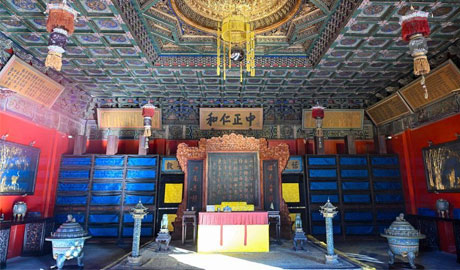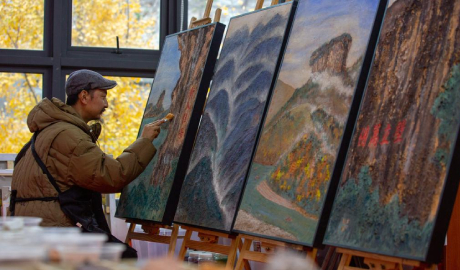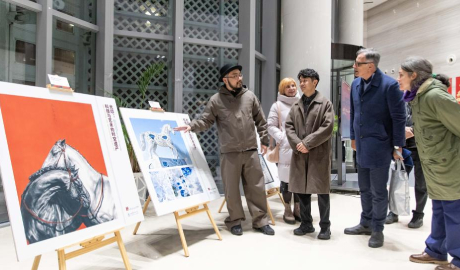

BEIJING, Aug. 15 (Xinhua) -- Memorial halls and museums dedicated to the Chinese People's War of Resistance against Japanese Aggression on Monday received streams of visitors as the whole nation marked the 77th anniversary of Japan's surrender.
On Aug. 15, 1945, the Chinese people's 14-year arduous fight against the invaders ended as Japan announced its unconditional surrender.
People visited war memorials and museums to mark the anniversary, refreshing their memories of the war and paying tribute to fallen heroes who had sacrificed their lives for national independence.
The Museum of the Chinese People's War of Resistance Against Japanese Aggression in Beijing hosted a photo exhibition starting Monday, showing the Communist Party of China's (CPC's) history of leading the country to the victory.
History has proved and will continue to prove that, under the CPC's leadership, there is no difficulty that cannot be conquered and no challenge that cannot be overcome by the Chinese people who are united as one, said Han Liang, a researcher at the museum.
Visiting the museum and reviewing the history can help the people better understand responsibilities they need to shoulder, according to Han.
Zhu Jiade, from southwest China's Sichuan Province, on Monday visited the September 18 Historical Museum in Shenyang, capital of northeast China's Liaoning Province.
"This is a part of history that no Chinese person should forget," Zhu said while visiting the museum. "From 1931 to 1945, the Japanese invaders trampled on our land. The Chinese people, unwilling to be humiliated, stood up as the backbone of the nation to face the national crisis and built a new Great Wall with their flesh and blood."
On Sept. 18, 1931, Japanese troops invaded the northeastern region of China, and then in July 1937, launched a full-scale invasion.
Thirteen descendants of Nanjing Massacre survivors were recognized by the Memorial Hall of the Victims of Nanjing Massacre by Japanese Invaders and became China's first batch of "inheritors of historical memories regarding Nanjing Massacre" on Monday.
The descendants, including children and grandchildren of Nanjing Massacre survivors from 10 families, were granted the titles, marking the offsprings of the survivors beginning to pass on the baton of recorded historical truth, according to Zhou Feng, curator of the memorial hall.
Since childhood, the descendants have learnt all about the detailed historical events of the Nanjing Massacre from the memories of previous generations. Many of them have long participated in relevant work such as volunteer docents of the memorial hall or accompanying the survivors to attend activities in Japan, Zhou said.
Six Nanjing Massacre survivors have passed away in 2022 and their deaths have reduced China's total number of registered survivors to 55 with an average age of 92.
"As the survivors get older, their descendants will become the main force in passing on relevant historical memories," said Wang Weixing, vice president of the Aid Association of Victims in Nanjing during the War of Aggression against China by Japanese Invaders.
The Nanjing Massacre took place when Japanese troops captured the then Chinese capital on Dec. 13, 1937. Over six weeks, they killed approximately 300,000 Chinese civilians and unarmed soldiers in one of the most barbaric episodes of World War II.
The Chinese government has preserved survivors' testimonies, recorded in both written documents and video footage. These records of the massacre were listed by UNESCO on the Memory of the World Register in 2015.
"Justice is invincible. The day of Aug. 15 should be always remembered by all Chinese people," said Wu Jianhong, curator of the memorial hall for Japan's surrender in Zhijiang County of Hunan Province.
After announcing its surrender on Aug. 15, 1945, Japan sent representatives to Zhijiang to hand over a map of Japanese troops deployed in China and sign a surrender memorandum between Aug. 21 and 23, 1945. ■

Lianyungang port welcomes largest group of S. Korean travelers under China's visa-free policy

Hall of Mental Cultivation of the Palace Museum reopens to public

Wuyi rock pigment painting in China's Fujian infuses modern artistic elements into tradition

China-Serbia digital art exhibition explores time, space, heritage

点击右上角![]() 微信好友
微信好友
 朋友圈
朋友圈

请使用浏览器分享功能进行分享
